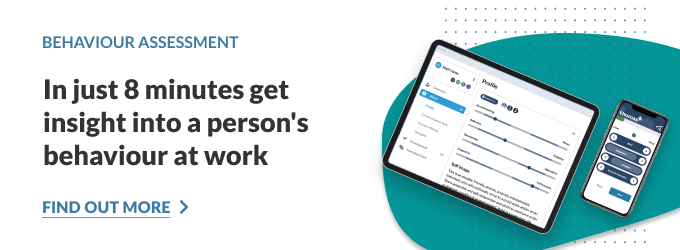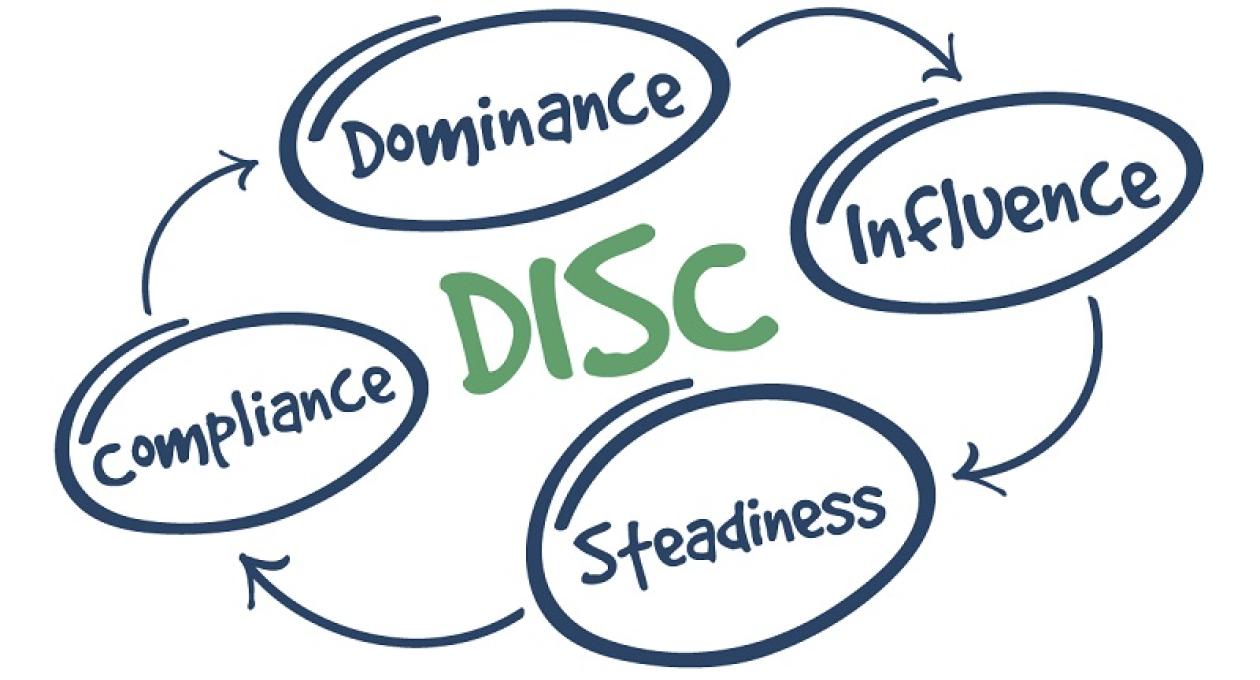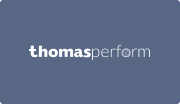Gut instinct? Track record? Hiring decisions don’t have to feel nebulous or be based solely on a one-off, artificial interview environment.

Imagine being able to hire individuals and build up a team with a whole range of different personalities and behaviors that complement one another. Every member would get to work to their own strengths and the team will support their weaknesses. That is what the DISC personality profile test offers.
Does DISC measure personality or behavior?
From the outset, it is important to state that DISC – in relation to its use in the workplace - is not a measure of personality, it is actually an assessment of your behavior. But what’s the difference between personality and behavior? Personality refers to a person’s traits and characteristics in general. By contrast, behavior refers to the way a person acts or reacts depending upon the situation. In short, personality is what we are, whereas behavior is what we do.
Now that we have established that DISC is a behavior assessment, read on to find out how you can take your own DISC profile test and how best to approach using DISC as part of a job interview or workplace assessment.
What is DISC?
DISC is a behavioral assessment which understands behaviors and priorities by gauging responses to various routine questions. DISC stands for Dominance, Influence, Steadiness and Compliance (sometimes referred to as Conscientiousness). The test-takers answers are charted on a graph which breaks down these four behaviors.
DISC theory was invented in 1928 by William Moulton Marston in his book ‘Emotions of Normal People’. He explained that people illustrate their emotions and responses using four behavioral types - Dominance, Inducement (Influence), Submission (Steadiness), and Compliance. Doctor Thomas Hendrickson later evolved the theory and developed PPA (Personal Profile Analysis) for the workplace in the late 1950s and early 1960s.
Although the acronym ‘DISC’ has only been used since the mid-twentieth century, the tenets of this four-style behavior model have actually been around for millennia. In fact, it’s believed that Hippocrates began to describe this concept around 400 BC as part of the ancient theory of the Four Temperaments of Humorism.
DISC personality types
By this point, you may be wondering how the DISC personality types are interpreted. The DISC assessment divides the test-taker’s personality up into four weights as mentioned above: Dominance, Influence, Steadiness, and Compliance (or Conscientiousness). It then explores the interplay between these.
Dominance - Those with high Dominance factors tend to see the big picture, accept challenges, sometimes be blunt, and get straight to the point. They are fast-paced and sceptikal.
Influence - Strong Influence scores highlight a person who places emphasis on influencing or persuading other people. They tend to be open and show enthusiasm, be optimistic, enjoy collaborating with others and dislike being discounted and ignored. Strong influencer scores illustrate someone sociable, fast-paced and accepting.
Steadiness - This factor illustrates a personality who places weight on cooperation, as well as sincerity and dependability. They tend to be calm, supportive, and don’t like to be rushed. They tend to be gentle and accommodating, moderate-paced and accepting.
Compliance - Finally, high Compliance (or Conscientiousness) scores illustrate a person who places emphasis on quality and accuracy, expertize and competence. They desire detail and enjoy independence, reason objectively, and tend to fear being wrong. They are logical, private and analytical - moderate-paced, and skeptical.
How DISC could benefit you
DISC is a non-judgmental tool which employers use to explore employees’ behavioral differences, and therefore their workplace strengths and weaknesses.
A DISC profile assessment has candidates answer a short series of questions honestly, which will then produce a detailed report about their personality and behavior. It’s a valuable tool for assessing a candidate's strengths and weaknesses. It can also serve as a benchmark for future employees, help them grow and understand how they might interact with other personality types within their team.
Simply put, a DISC profile provides a common language upon which employees can build and sustain relationships. It can help test-takers better understand themselves as well as how they respond to specific situations, and how that might affect their dealings with clients and team members.
How DISC tests can help employees
Increase their self-knowledge. What motivates them? What causes them frustration? How do they respond to conflict?
Improve work relationships. What communication methods work for different workers? What other communication methods work best for team members?
Facilitate team success. Create the best environments for teamwork, and facilitate the delivery of constructive criticism.
Improve sales. For employees, knowing themselves and learning about others can help them identify and respond to various customer behaviors and land that big sale.
Become a great manager. Understand the various dispositions, and priorities, in their team, and learn how to get the best out of all of them.
The Thomas Personal Profile Analysis (PPA)
Thomas’ Behavior assessment (PPA) is a DISC-based tool which allows employers a greater level of certainty when recruiting. It offers an accurate insight into how a potential employee is likely to behave at work and respond to certain situations or pressures.

As a result, employers can better understand what makes employees ‘tick’ and how to manage them in a way that keeps them fulfilled, happy and confident in their work. Staff turnover levels can improve greatly as well as efficiency and productivity. The PPA can also help improve self-knowledge and self-awareness when it comes to how employees respond to conflict, motivation, and stress factors.
How does the Thomas International DISC tool work?
For the Thomas DISC tool, individuals are asked to choose two trait adjectives from a list of four, one ‘most like’ and one ‘least like’ them. This process is repeated 24 times, giving 48 choices from a total of 96 words. An individual’s response patterns are then compared to themselves rather than the scores of a comparison group.
Because the theory views everyone as the ultimate expert on themselves, there are no right or wrong answers; DISC testing simply helps gauge various behavioral styles and priorities. Some personality styles might be better suited to certain roles. It isn’t always completely black and white - it may sometimes be difficult to decide which description to select. All you can do is honestly consider what you think best represents you.
We’ll now answer some commonly asked questions so you can develop a better idea of how DISC assessments can improve your recruitment efforts.
DISC profile FAQs
Is the DISC profiling test accurate?
DISC measures how employees might respond to problems, pace, procedures and people. It wasn’t constructed to predict how proficient the participant is in terms of solving problems or interacting with people - just how energetically the participant wants those outcomes. That said, the DISC process does boast extremely high validity, which means that participants really agree with the results of the assessment.
Can you fail a DISC assessment?
The answer to this is no. The potential employer or assessor is likely using the DISC test to work out how you might fit into a team, whether the work involved would suit you, or how they might interact best with you. The only way to fail, then, is to lie, and make your answers suggest a way that you wouldn’t usually behave.
That being said, of course, you might be being evaluated for certain characteristics, for example, the potential employer looking for a salesperson might want someone with high D levels (suggesting a personality that is strong-willed, forceful, and ambitious). For a tech hire, they might look for high C levels, suggesting you are exact, logical, systematic and cautious. Taking the DISC test honestly will reveal your true strengths. The DISC process curates an outcome that should be best for both the applicant and the employer.
What does my DISC score mean?
You should get a full outline of your DISC outcome after your test, but to better understand what the four behaviors suggest, see this page on Thomas’ Behavioral assessment.
Is this the best test for indicating career success?
For recruiting for leadership roles and considering career advancement, an employer might instead want to choose the Thomas High Potential Trait Indicator (HPTI), a workplace personality indicator which specifically identifies leadership potential through user personality traits.




